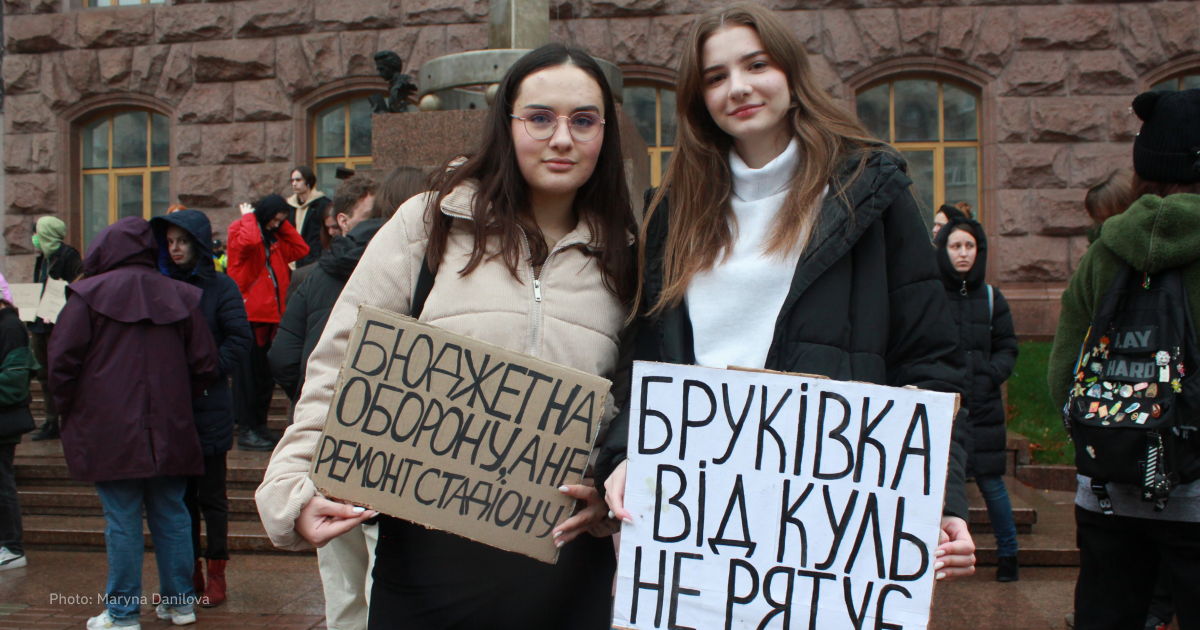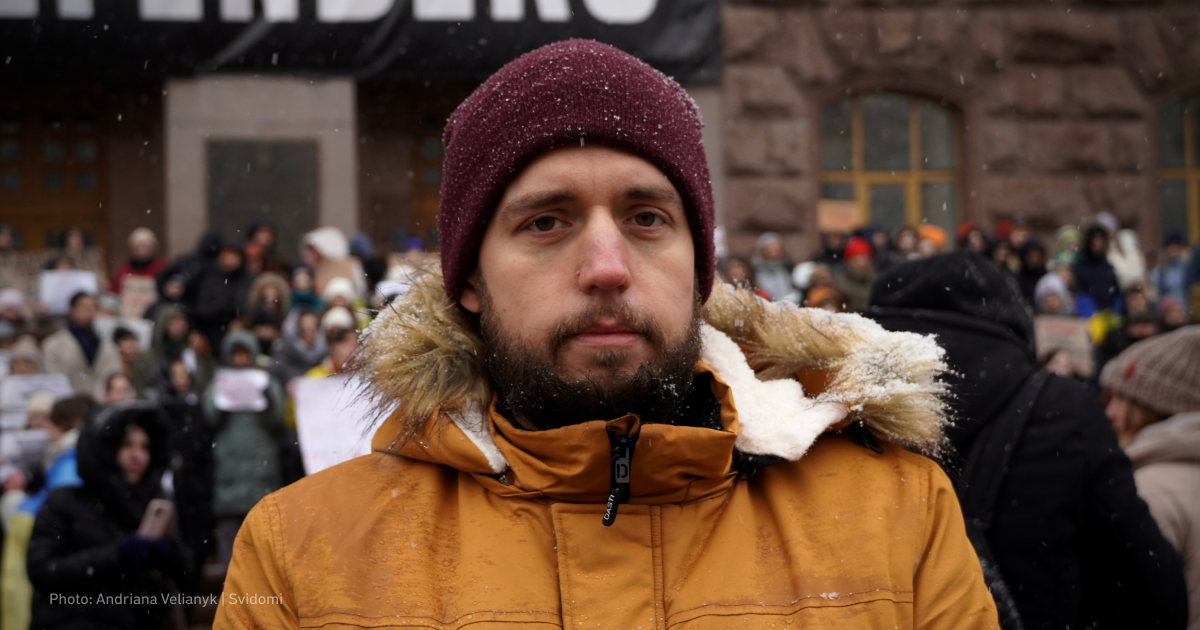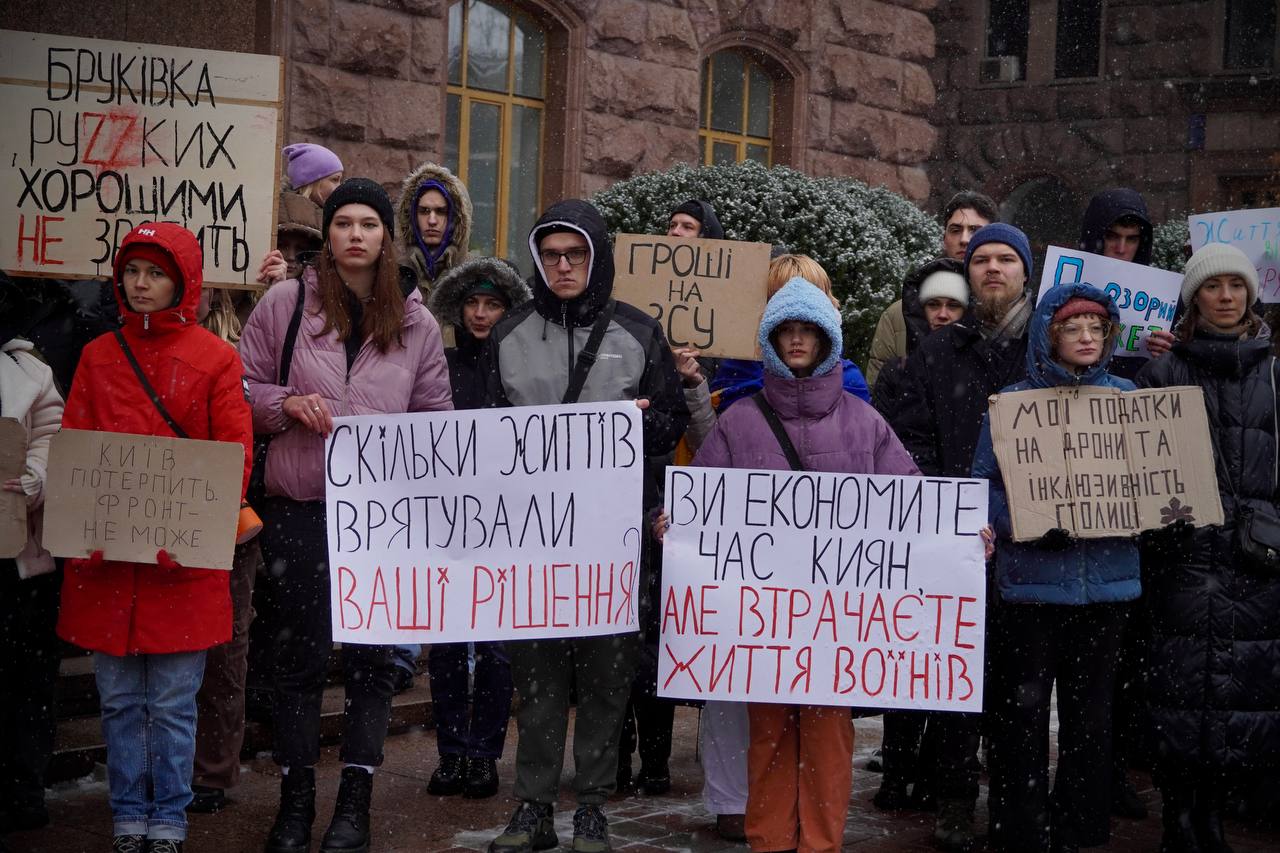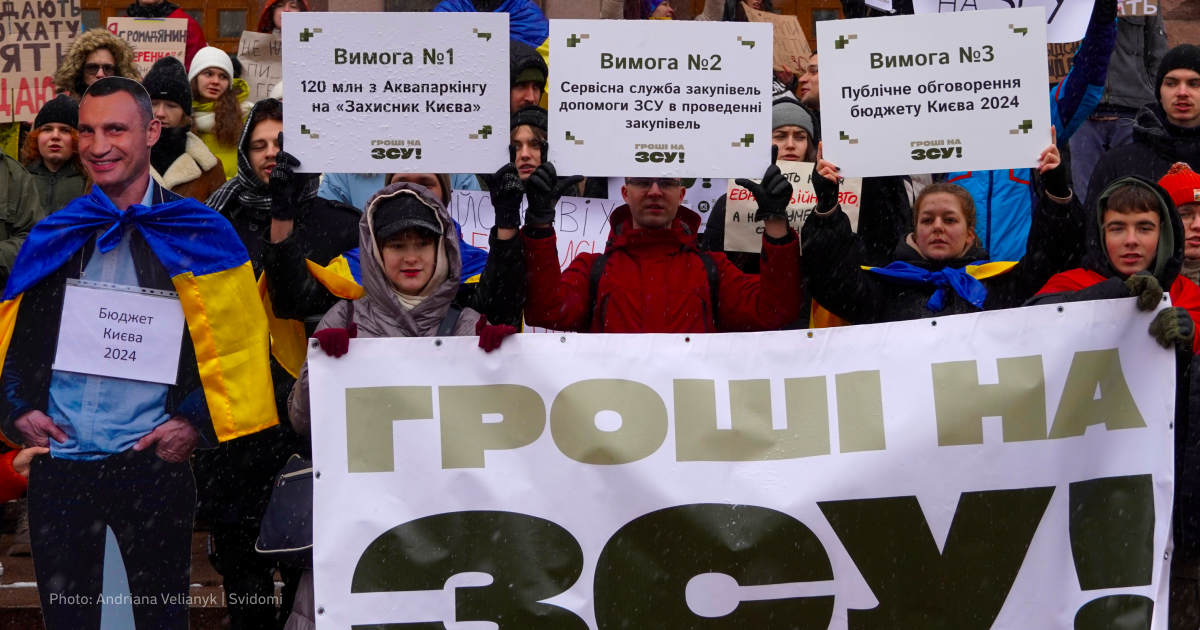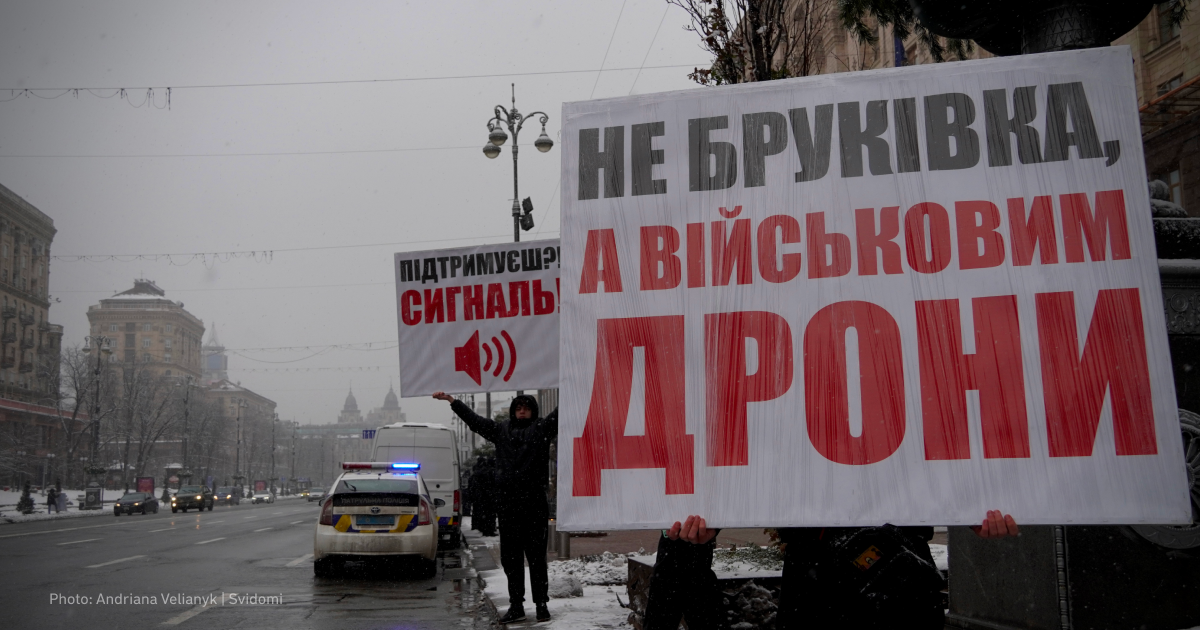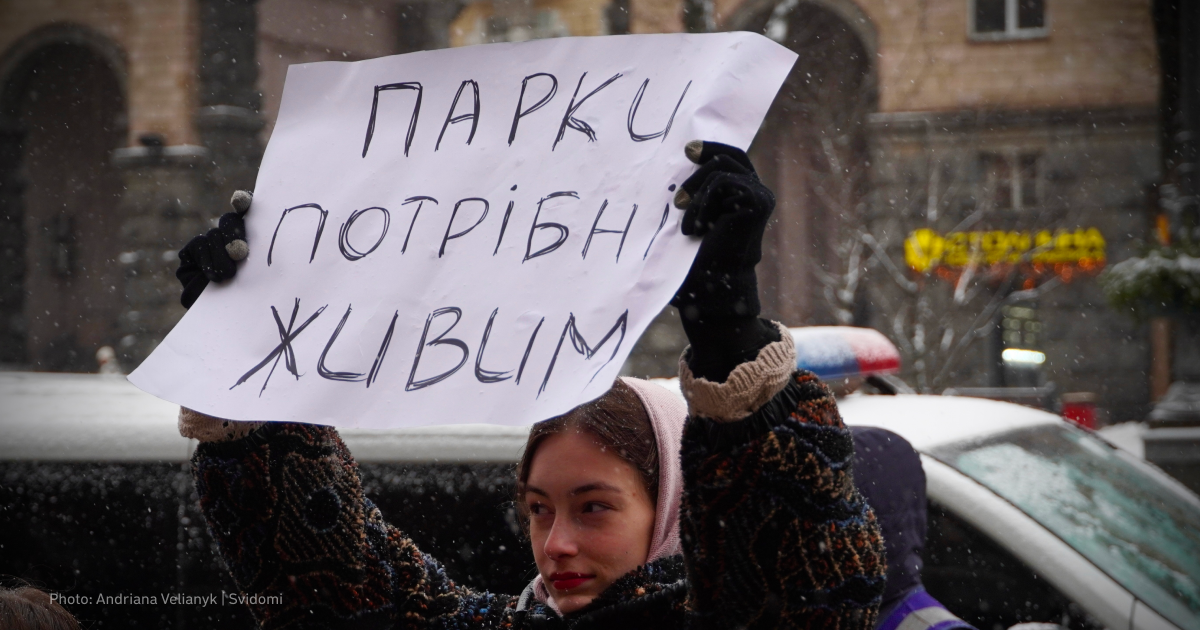"Drones, not paving stones": public procurement, local budgets and the great war — what's going on?
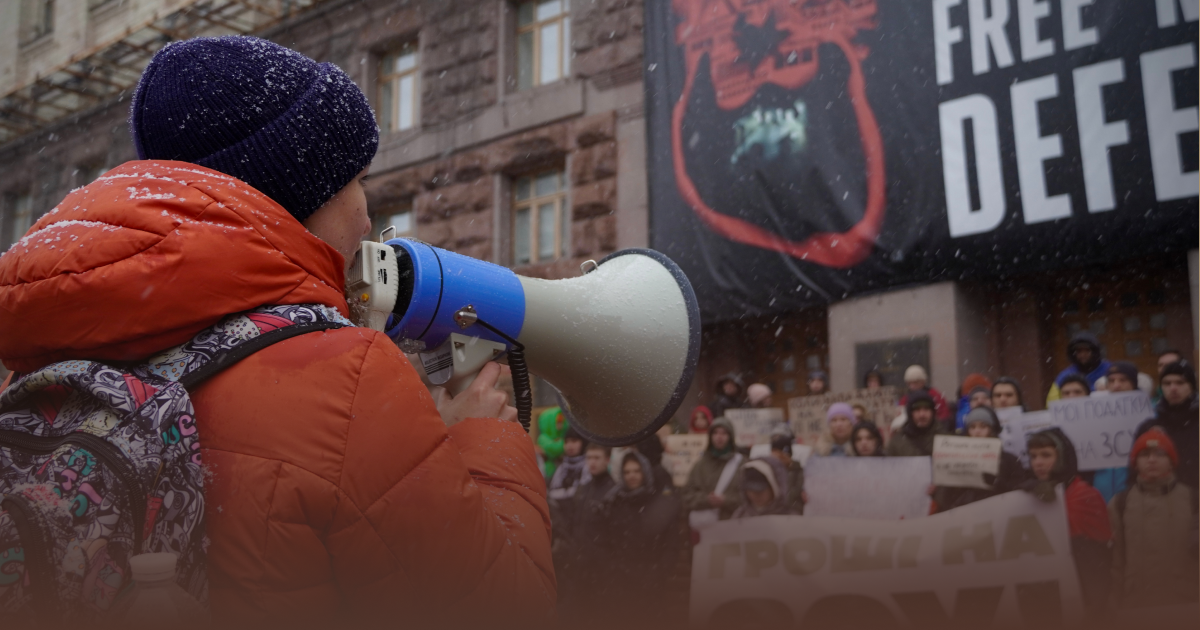
"Money for the Armed Forces", "Transparent Budget — Free Country", "Work, Authorities" — this is what you can hear in Khreshchatyk and dozens of other squares near city administrations in the mornings when activists gather during weekends and demand that the maximum amount of money from the city budget be allocated for defence.
Alongside the fighting in the east and south, civilian life, municipal improvement and construction continue in rear cities. Protests take place in various cities. The Verkhovna Rada has passed a law on redistributing taxes from military income, and local government representatives complain their communities will have no money to operate.
In this article, we explain what public procurement is, what local budgets are spent on, what the military personal income tax is, and what will change after the law on its redistribution is passed.
What is public procurement and where to look it up?
Public procurement was one of the most corrupt areas to be reformed after the Revolution of Dignity. In December 2015, the Verkhovna Rada adopted the Law on Public Procurement. In 2016, the electronic public procurement system Prozorro, a platform designed to make procurement as open and transparent as possible, became mandatory for public clients.
Prozorro ideologist Maksym Nefodov and former PR coordinator Fedir Krykun wrote a book about how the company managed to enter the previously closed territory of public procurement. The subtitle is "Doing the Impossible in the Ukrainian Government".
In procurement, you can see the price of sewer utility holes, what children eat in kindergartens, or how much goes into repairing pipes or replacing windows in state institutions. At the end of November, the system had over 55,000 announced tenders and almost 259,000 active suppliers.
Here's how the procurement process works:
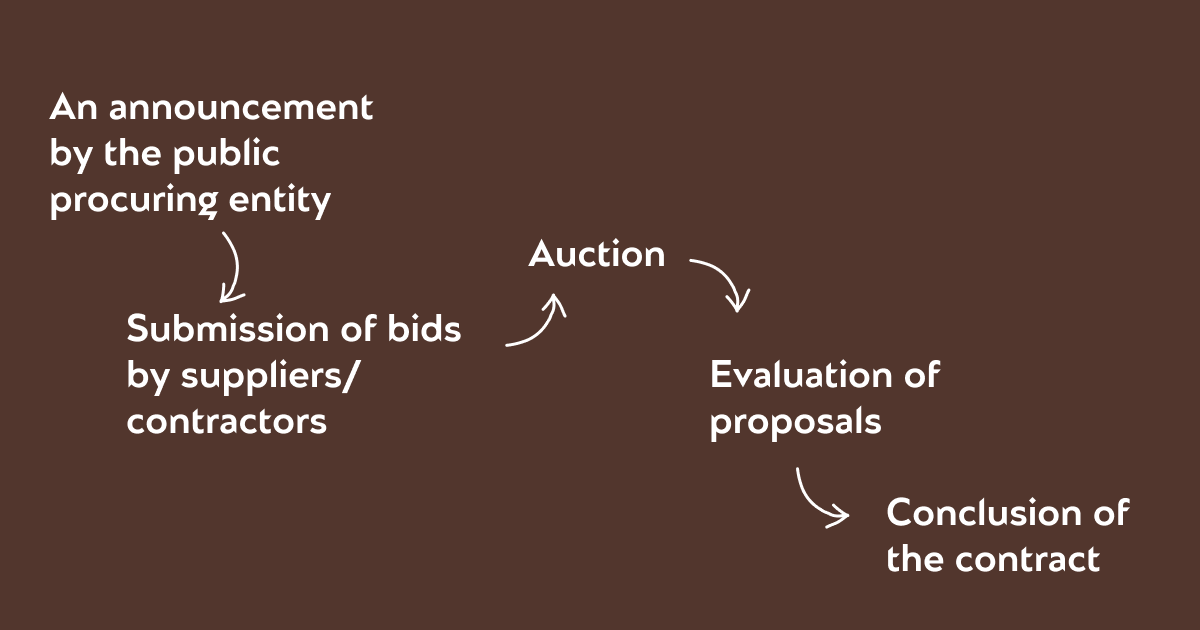
The lowest bidder wins the contract.
Any citizen can follow the procurement process on different platforms:
So, there is no corruption in procurement?
Yes. It's just easier to find it through Prozorro.
Here, you can see where government bodies buy goods and services, at what prices, and whether they differ from market prices. Instructions on how to detect corruption in the system are available here.
A more complicated method, usually used by journalists, is to look for possible links between the clients of tenders and the contractors who win them.
For example, the Kinokit company regularly won tenders to produce content for the Rada TV channel. According to the YouControl system, the company won state tenders worth UAH 184 million last year. It also won all the competitions it applied for.
Bihus.info journalists found that Kinokit is linked to the former deputy head of the presidential administration, Kyrylo Tymoshenko.
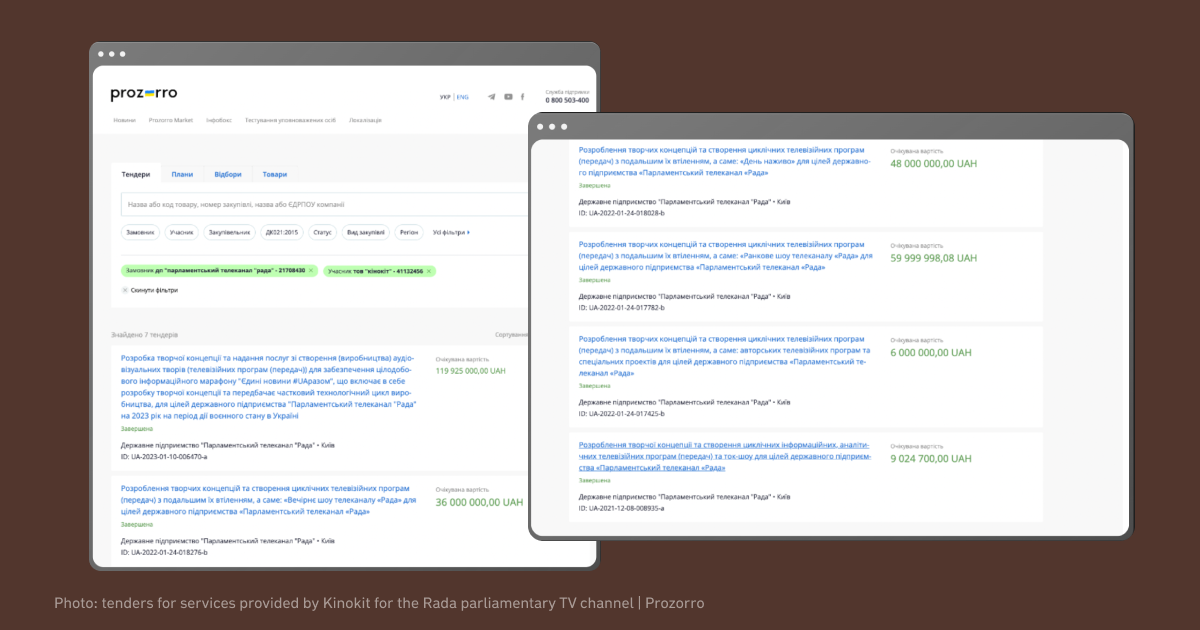
Procurement during a full-scale war
On February 28, 2022, the government allowed direct contracts to be concluded during martial law without holding auctions in Prozorro. The decision was justified because public procuring entities could quickly meet their needs during this period.
When the market for goods, works, and services stabilised, the Cabinet of Ministers reintroduced mandatory public procurement on June 24, 2022.
Between February 24 and the end of 2022, Ukraine held 94,000 public tenders on Prozorro for UAH 120 billion. Most of the money was spent on:
- construction and repair works (UAH 93.5 billion)
- fuel and electricity (UAH 49 billion),
- medical equipment and pharmaceutical products (UAH 26 billion).
In 2023, following an investigation by journalist and founder of the Nashi Hroshi (Our Money) project Yurii Nikolov into inflated prices for food for the military, the Ministry of Defence also returned to public procurement.

From the end of April, defence contracting authorities must report on non-weapons procurement (food, clothing, fuel). In the case of food, contracting authorities have to report the price per unit of each product.
If we analyse all procurements on Prozorro since the Ministry of Defence started reporting again, the ministry is often the most expensive contracting authority.
Other significant expenditures include:
- construction works and routine maintenance
- energy carriers
- vehicles;
- medical devices and medicines.
Are these expenses relevant?
Over the past two years, the question of the reasonableness of procurement and its prices has become popular, as in addition to the necessary food or repairs, funds are allocated for large multi-million dollar construction projects, municipal improvement and other goods that now seem unjustified.
The society drew attention to the appropriateness of procurement after almost UAH 900,000 was allocated for drums for a shelter for children in Kyiv, a stadium in Kivertsi, Volyn, for UAH 145 million, or procurement for the Zaporizhzhia NPP temporarily occupied by Russians.
Procurements that might not seem to be a priority during a full-scale war can be found in every region of Ukraine. On May 16, 2022, the Bakhmut City Council purchased 3,198 rose seedlings — while the front line was 30 km away.
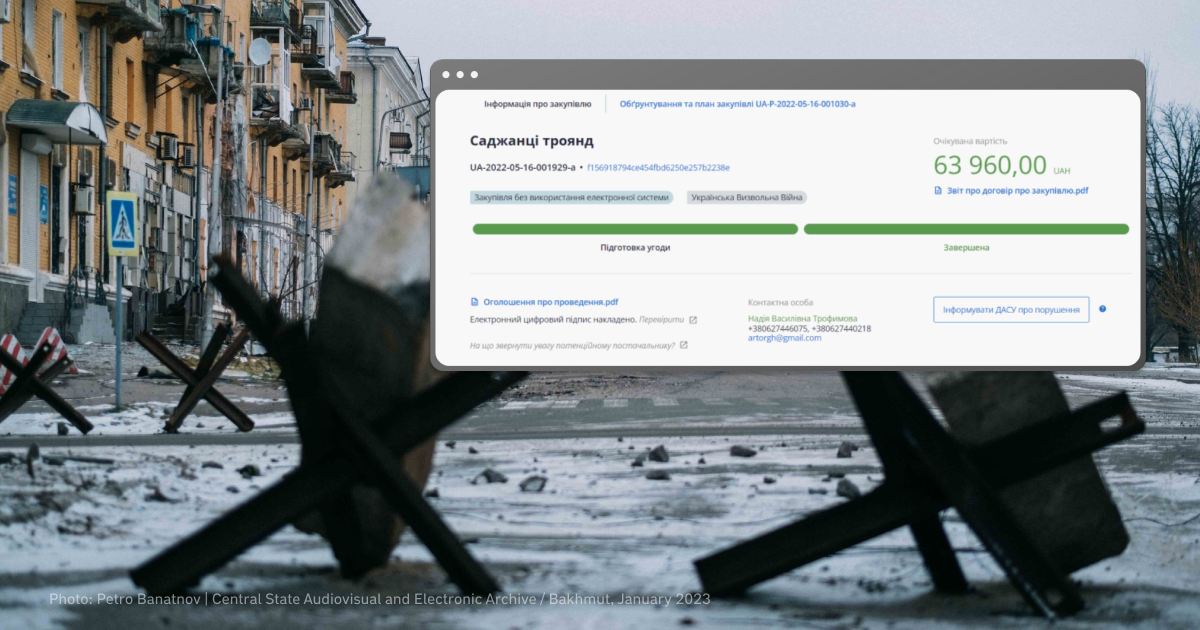
In a report on the same day, the American Institute for the Study of War wrote that Russian troops continued offensive operations south of Sievierodonetsk, which is likely to be an advance towards Bakhmut.
Pavlo Kyrylenko, who was then the head of the Donetsk Regional Military Administration and is now the head of the Antimonopoly Committee, reported the day after the contract for the purchase of roses that the Russians had shelled a school and several infrastructure facilities in Bakhmut.
On the other side of the country, there is Ivano-Frankivsk, a rear regional centre in the west, where they also care about urban amenities.
In the village of Uhornyky, which is part of the Ivano-Frankivsk community, the Department of Infrastructure, Housing and Communal Policy announced tenders for the renovation work near the monument to Stepan Lenkаvskyi and the symbolic grave of the Fighters for the Freedom of Ukraine in Uhornyky for UAH 453,000 and UAH 254,000, respectively. The improvement services include the installation of paving stones, curbs, garbage collection and repair of sewer wells.
The almost half-million-dollar tender was announced in early October 2023, after President of Ukraine Volodymyr Zelenskyy had repeatedly called on local officials to use budget resources "properly" in his addresses.
"I would like to address all local authorities in our country: people should feel that budget resources are used fairly and correctly. Everyone understands what we are talking about. Paving stones, city decorations, fountains can wait — victory comes first," he said on July 20, 2023.
Position of activists and justification of procurement
That's why Prozzoro announced the launch of a mechanism for justifying procurement so that procuring entities could explain the rationale behind their tenders.
"There have always been procurement scandals, but the authorities and procuring entities have never shown their readiness to respond as they do now. Over the past six months, dozens of questionable procurements have been cancelled. On the other hand, we need to understand that stories about allegedly unjustified procurement often go much deeper, and we need to look into them," said Natalia Shymko, Deputy Director General of Prozorro.
At the same time, the public monitors procurement. Despite the ban on protests under martial law, people in different cities come out to protest. Maryna Danilova is 18 years old, originally from Chuhuiiv (a city in the Kharkiv region that did not fall under Russian occupation but suffered from shelling — ed.), but she lives and studies at a university in Kyiv and comes to protest in front of the Kyiv City State Administration.
If we could come out to the Presidential Office (during martial law, the 'government quarter' is closed to the public — ed.), I think we would have done it, but since this option is not available, we have to come out to the Kyiv City State Administration. The authorities must feel that the public cares about what is happening in the country, and we will come out as much as necessary to achieve results. As long as the Armed Forces stand for us, we will stand for them,
says the student.
Myroslav Havryshchuk works as a product manager for an IT company and is one of the founders of the initiative group Money for the Armed Forces in Kyiv. The activists formed the group on September 16, 2023, when Kyiv City Council members said that a group should be created for practical cooperation between the government and citizens, so lawyers, financiers, and other professionals who, in addition to protests, analyse the budget and tenders and register petitions, joined together.
It's not just a matter of procurement. It's a matter of allocating funds. For example, we believe that the planned transport interchanges are inappropriate. The reconstruction of parks can wait. We also talked about the tourism budget, with 18 million allocated for it in 2024,
says Myroslav Havryshchuk.
While we are talking in front of the Kyiv City State Administration, activists nearby are chanting the word "Shame". Posters and banners read, "When a house is attacked, it is not whitewashed, it is defended", "The budget is for the people, but the people are at war", and "Evacuation vehicles save lives, not flower beds or stadiums".
Every day, new fundraisers for the military appear in Ukraine, closed by volunteers and ordinary people because the state cannot provide the army with everything it needs — hence the problem of budgets.
Local governments are trying to allocate funds for defence to help military units, pay military personnel, and purchase goods or transport to the front.
In the first half of 2023, public procuring entities made UAH 775 million worth of drone purchases on Prozzoro. Most of the money was spent in Dnipro (UAH 396.7 million), Zhytomyr (UAH 60 million), and Kyiv (UAH 59.7 million) regions.
In October, procuring entities planned to spend over UAH 400 million on 150 UAV purchases. Activists and the central government believe this is insufficient, so the Verkhovna Rada passed a new law to allocate some of the funds from local budgets to defence.
Redistribution of military personal income tax: a necessity or robbing cities?
"We all see people demanding that budgetary resources go on defence rather than paving and street repairs. This is the right thing to do. All resources should be directed to make Ukraine stronger," Volodymyr Zelenskyy said on November 6 (the city council approves the territorial community budget, the state budget is approved by the Verkhovna Rada — ed.)
Two days later, on November 8, 2023, the Verkhovna Rada voted in favour of draft law No. 10037 on the "redistribution of military personal income tax". On November 17, it was signed by Volodymyr Zelenskyy.
The Military Personal Income Tax is a tax on the income of military personnel, police officers, rank-and-file, and senior officers that went to local budgets. As military salaries increased during the full-scale war, so did taxes.
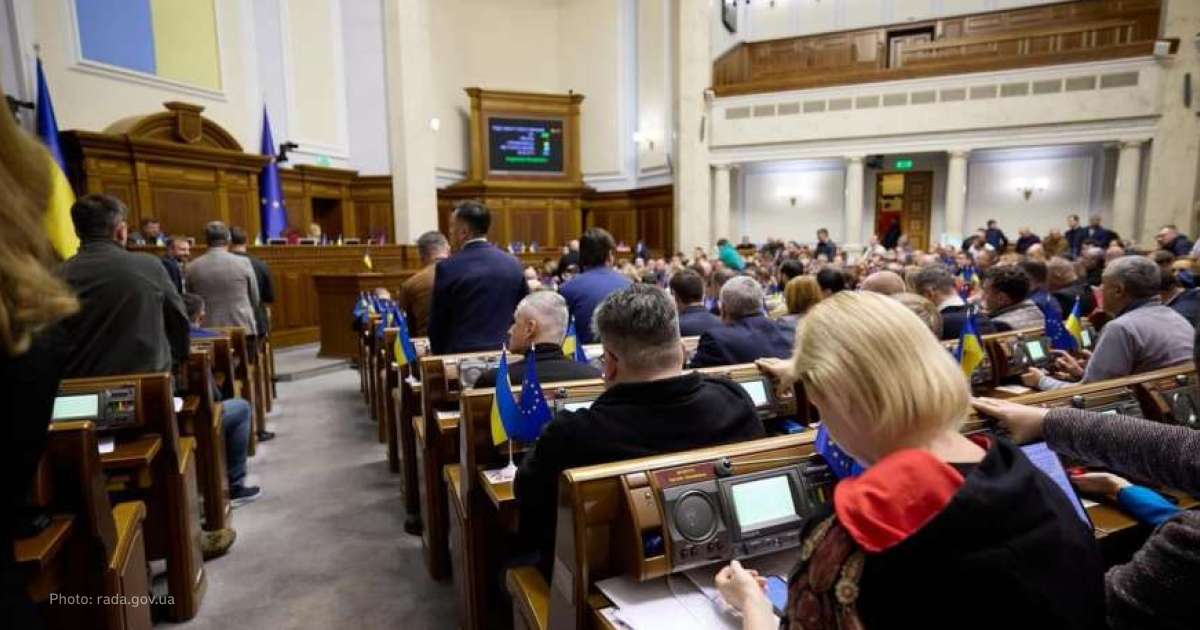
According to the newly adopted law, this part of the taxes should be redirected to defence. The Ministry of Finance explains that this will allow "not to waste budget funds on non-priority things during the war".
Revenues from the military personal income tax from 1 October 2023 to 31 December 2023 are transferred:
- 50% - to the State Service for Special Communications and Information Protection for the purchase of special equipment and machinery;
- 50% - to the Ministry of Defence for the purchase of artillery systems;
From January 1, 2024, to December 31 of the year, when martial law is terminated or cancelled:
- 45% - to the State Special Communications Service for the procurement of special machinery and equipment;
- 45% - to the Ministry of Strategic Industries for the manufacture of defence products;
- 10% - for logistical support of military units.
In the explanatory note to the draft law, Finance Minister Sergii Marchenko writes that the projected revenues from military personal income tax are UAH 25.8 billion in 2023 and UAH 93.7 billion in 2024.
For regions that suffer from Russian shelling or have experienced a decrease in other sources of tax revenue (business relocation, internal migration, and economic disruption), these losses could be offset by military PIT revenues.
The Centre for Economic Strategy published the results of its research in Ekonomichna Pravda, which shows that many local budgets have surpluses due to additional revenues from military personal income tax. However, if these taxes are transferred to the central budget, a third of communities may have budget deficits.
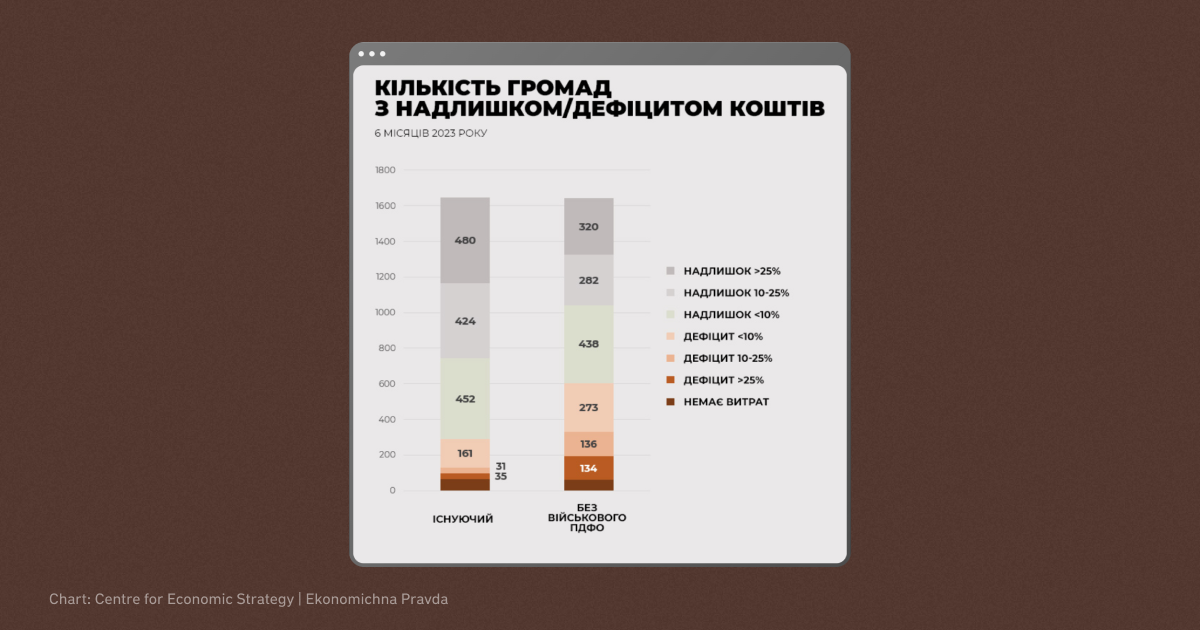
Prime Minister Denys Shmyhal said that local budget revenues from military personal income tax had increased eightfold during the full-scale invasion. He announced that the state would provide subsidies to communities lacking funds after the PIT redistribution.
Thus, the local budget resources in 2024 will be UAH 75 billion more than in 2021 before the full-scale invasion,
Shmyhal wrote on his Telegram channel.
The mayor of Lviv (a city in the west, 70 km from the Polish border, which is periodically shelled by Russian missiles; as of December 2023, 23 people were killed and 106 injured in the shelling — ed. ) Andrii Sadovyi, wrote that "if these funds help to destroy the enemy, then Lviv is ready to share part of the personal income tax with the state" (the budget of the Lviv territorial community for 2023 was UAH 1.8 billion; in November, the Lviv City Council redirected UAH 229 million of military personal income tax to the army from the funds received in the city budget from October to November 27 — ed.).
However, he called for transferring military personal income tax as transparent as possible and returning military personal income tax to local governments after the end of martial law.
At the same time, the withdrawal of military personal income tax will weaken communities, according to Oleksandr Slobozhan, Executive Director of the Association of Ukrainian Cities, and Oksana Prodan, Advisor to the Head of the Association, in their column for the media outlet ZN.UA.
They believe this will deprive city councils of the opportunity to help the defence forces and provide quality services to residents. At the same time, they emphasise that it will not create any advantages for the Joint Forces of the Armed Forces of Ukraine, as the funds will "dissolve in the state budget".
Concerns about the redistribution of military personal income tax were expressed by mayors of regional centres located closer to the frontline.
The mayor of Mykolaiv (a city in the south of the country, between Kherson and Odesa, which was fought over at the beginning of the full–scale invasion; after the unsuccessful attack on the city, Russians began shelling Mykolaiv — ed.) Oleksandr Sienkevych told Forbes that the Mykolaiv authorities would have to fire people or introduce shorter working hours, switch to hourly water supply and save on street lighting.
According to the Budget Code of Ukraine, village, town, and city territorial communities transfer 40% of their communities' personal income tax to the state budget. Kyiv transfers 60%.
Mykola Sylenko, executive director of the Chernihiv branch of the Association of Ukrainian Cities, told Suspilne that border communities will suffer the most from the withdrawal of military personal income tax.
It will be a disaster if we lose this revenue stream. Given that we are on the border, it is too early to talk about recovery,
Serhii Dedenko, head of the Semenivka community (a community in the Chernihiv region, 11 km from the Belarusian border — ed.).
Due to constant shelling, people and businesses are leaving the community, and agricultural enterprises located near the border with Russia, according to Dedenko, have either gone bankrupt or are not operating because of the danger. The community has lost many jobs and a bank of land that was cultivated before the full–scale invasion.
The activists from the Kyiv–based initiative group "Money for the Armed Forces" say that the adoption of the law on the redistribution of military personal income tax has not changed the aims of the initiative.
The three primary demands are:
- redirect UAH 120 million allocated for the construction of a car park in Obolon to the Kyiv Defender programme;
- to create a procurement service for the Armed Forces of Ukraine - to organise permanent work of the Kyiv City State Administration structural units to assist military units in conducting tender procurement.
- public discussion of the Kyiv budget for 2024.
Kyiv has enough money to help the military. Our requirements are not only about drone procurement but also about the inclusiveness of the city because the military are returning [from the combat zone], and today, Kyiv is not in a position to say that a person with an injury or disability can move around the city safely. That is why we believe that the funds that should be used for the improvement of Kyiv should be prioritised for inclusiveness,
says Myroslav Havryshchuk, an activist and representative of the Kyiv initiative group Money for the Armed Forces.

